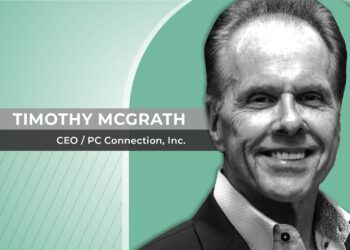Kieran Murphy, President and CEO of GE Healthcare believes innovation is the key to increasingly precise health outcomes.
For Kieran Murphy, President and CEO of GE Healthcare, the key to the future of healthcare is precision—precision diagnosis, precision therapy, and precision monitoring of patients, and that means embracing a technological revolution in an industry of which GE is at the forefront.
Upon taking over as CEO of GE Healthcare in 2017, his goal was to look at the big picture— what he calls the “ecosystem” of healthcare— with a view to honing this precision, advancing technologically, and capitalizing on a vast network of partners around the globe to maintain GE Healthcare’s position as one of the premier healthcare companies in the world.
“I’ve been with GE Healthcare since 2008 so when I came into the job I had a pretty good sense of the way I saw the future. We’re a very complete player in the sense that if you think about the spectrum of healthcare, you want precise diagnosis, you want the appropriate therapy, and then, if you’re a patient, you want follow up to make sure that you’re being monitored in a precise manner. It was only when I took the job that I fully appreciated how strong we are across that spectrum.”
GE Healthcare is a global company headquartered in Chicago, Illinois. A longstanding subsidiary of General Electric, the healthcare division recently announced plans to become a standalone company. It operates in more than 140 countries worldwide with around 54,000 employees and $19 billion in annual revenue.
“We have a track record of really strong organic growth, achieved by developing products and services designed around customer needs and integrating those into their systems. We are determined to invest in technologies and allocate capital to areas where we can achieve significant growth. We have the license to build a big platform in this market, and that’s exactly what we’re going to do.”
A changing industry
The principal activity of GE Healthcare is imaging, which is essentially the ability to use medical devices to create visual representations of the body’s interior for clinical analysis.
The company also works in the fields of software development, mobile diagnostics, patient monitoring systems, disease research, drug discovery, and biopharmaceutical manufacturing, all cutting-edge areas of medical science today that are making a difference around the globe.
“We are one of the leading imaging players in the world, the numbers are staggering in terms of how many images we produce per minute every day all around the globe. We just have great technology. We keep working on how to improve that technology so instead of thinking about it as creating an image, we think about it through the lens of a doctor or a clinician or a radiologist. What are they looking for? What decisions are they trying to make?”
“In the case of precise therapy, we provide the toolbox for making the biggest biopharmaceutical products in the world. We’re currently looking to grow this area of the business and carry out collaborations in this space, and we’re really excited about the future.”
The technology of the future
Technology will naturally play a huge part in these advances and Murphy believes that the investments GE Healthcare is making in areas such as data, AI, cloud, and analytics is precisely what will drive growth for the company in the near-to-long-term future, yet he stresses that GE does not work alone in this regard, relying on a series of collaborations with leading academic hospitals and firms like Partners HealthCare, Johns Hopkins University and Nvidia to name a few.
“When I think about our strategy along those lines, we’re looking at integration of data sets, the application of AI and machine learning to our imaging system, and the advancement of health cloud and computer analytics that will allow clinicians effectively to have clinical decision support. It’s really the integration of data sets that I believe is going to be a huge thing in diagnostics over the next five years.”
Another key area of innovation for GE Healthcare that Murphy highlights is life sciences where the company is an increasingly strong player in the biopharmaceutical and bioprocessing space.
“I believe that with the advancement of biologics in medicine, the advancement of better vaccines and novel treatments coming from the use of biologics that we are really well positioned to take advantage of growth in that industry,” he said.
A global presence
GE Healthcare has long been the market leader in its field in the US, yet with a huge commercial presence around the world, Murphy stresses that the company has the best commercial reach and supply chain of any of its competitors, along with the ability to carry out projects at scale anywhere around the globe, including developing markets.


Under the agreement, GE Healthcare has deployed 585 units of diagnostic imaging equipment including MR, digital mammography, x-ray and ultrasound systems across 98 hospitals in all 47 counties—and will provide medical technology training and technical support to the medical staff to ensure the optimal operation of the equipment.
Yet Murphy stresses that this global presence is only possible through strong and enduring partnerships.
He cites an impressive network of 25,000 different partners and suppliers with which GE Healthcare works on everything from research to manufacturing, viewing them as two-way relationships in which both parties benefit and which are crucial to maintaining quality control and improving the processes of GE.
“Given our dependence on suppliers, we also invest in them to ensure that they achieve better quality and reliability. These are critical factors. We have important sourcing arrangements with many suppliers so our success is very much linked to their success.”
Operational efficiency
Within such a large enterprise, operational efficiency matters, and Murphy is quick to emphasize what sets GE Healthcare apart from competitors.
For example, the company has recently looked to reduce costs, not by skimping on quality, but by overseeing greater productivity and efficiency from the initial design of its products all the way to manufacture.
“If we’re not going to have dilution of margin, we have to get cost out of our systems and our products and the way we run our business That’s not going to be at the expense of quality because part of the cost equation is to ensure that our products are reliable, easy to install, and designed for manufacture and service.”
Ultimately, for Murphy, the key theme that sets GE Healthcare apart from its competitors is scale. He argues that the wide-ranging investments made by the company, along with its ability to think about platforms rather than point solutions, really make the difference to its standards and outcomes.
“When you think about the whole area of AI and apps, a lot of people can deliver point solutions. We’re at a scale where we think bigger than that. We can work with pharma to help design clinical studies. We can make batches of products for those studies. We can help them industrialize processes to achieve efficiency. We can follow the patient all the way through monitoring.”
“Effectively we’re a set of great, interconnected businesses with global scale, we have talented teams that know how to run their business. We understand that the pace of growth in new digital technologies presents us with an opportunity to build a platform as a leader in helping clinicians across the world with tools for decision support. That’s what sets us apart.”
Today GE announced plans to separate GE Healthcare into a standalone company https://t.co/jmuHmNFfwY pic.twitter.com/O6lkNXqOQ7
— GE HealthCare (@GEHealthCare) June 26, 2018














